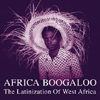 One of the best international compilations that I heard this year was Tumbélé, which examined the impact of African music on the Caribbean. Africa Boogalo is its logical counterpoint, providing ample evidence that the vigorous cultural exchange of the mid-twentieth century yielded equally stunning results on the other side of the ocean (though not without a certain degree of weirdness).
One of the best international compilations that I heard this year was Tumbélé, which examined the impact of African music on the Caribbean. Africa Boogalo is its logical counterpoint, providing ample evidence that the vigorous cultural exchange of the mid-twentieth century yielded equally stunning results on the other side of the ocean (though not without a certain degree of weirdness).
Honest Jon’s
The immediately striking thing about this thirteen-song compilation is how wholeheartedly some of these bands embraced Latin sounds. As the liner notes by Gary Stewart (Rumba on the River) point out, when Latin music hit Africa, it hit big: many musicians Latinized their names or started writing lyrics in Spanish (and some who didn’t know Spanish resorted to Spanish-sounding gibberish). I’m not sure how much of that is present here, as my knowledge of African and Latin languages is uniformly abysmal, but there are several songs that sound undilutedly Latin. The most surprising example is probably Orchestre Poly-Rythmo’s breezy “Il N’est Jamais Trop Tard,” which betrays absolutely none of that band’s primary characteristics (such as traditional Beninese percussion). If the lyrics were not in French, it would be pretty easy to mistake it for an authentic Latin concoction. It’s not a bad song, but it is a bit mystifying, given both their percussion prowess and their reputation as innovators.
Fortunately, not all of the artists included here are as shamelessly and slavishly imitative. In fact, fellow Beninese luminary Gnossas Pedro contributes an absolutely killer track (“Adigbedoto”) that melds sultry, sinuous Latin rhythms with clean, intertwining guitar lines that are distinctly African. Gambia’s Amara Toure is responsible for another of the album’s many highlights ("N'Niyo"), combining a languorous, sexy groove with a smoky saxophone, impassioned vocals, and an elegantly melancholy web of guitars. In general, nearly every song on African Boogaloo features relatively distinct and unmolested Latin rhythms, saving innovations and individual touches for the guitars and the horns (the smoldering sax on Laba Sosseh’s “Guantanamo” is particularly inspired) . One of the only bands that depart from this template are the legendary Orchestre Baobab, who adroitly Latinize a Senegalese mbalax rhythm.
Not all of the efforts here are entirely successful, as the title track is pretty painful (it sounds like a black French Big Bopper covering “Low-Rider” with somewhat ridiculous flute accompaniment). I’m not quite sure why it was included, as it was recorded by a group of expatriates living in Paris, but it does feature one of the titans of African jazz (Manu Dibango). Maybe the compilers just liked the title (not sure why though, as the word “boogaloo” always makes me cringe). That’s pretty much the only questionable inclusion though. Admittedly, however, I was also caught a little off-guard by Charles Lembe’s “Quiero Wapacha”, which seemed to crib a bit from the Venture’s “Walk Don’t Run.”
Africa has certainly been anthologized to death recently, but this is one of the best attempts I’ve heard thus far. There is certainly some brazen cultural appropriation occurring here, but the songs are almost invariably excellent (especially those by Orchestre OK Jazz, who fill nearly a quarter of the album). Latin-Afro fusions can get pretty frenetic, cluttered, and over-the-top at times, but Africa Boogaloo’s two compilers (Mark Wimmers and Mark Ainley) have wisely kept the focus on simmering, laid-back grooves, making for an album that holds up extremely well with repeated listens. They also have an ear for great guitar playing, and Africa had some of the best guitarists around in the ‘60s and ‘70s. This will probably not be leaving my stereo for quite some time.
Samples:
- Gnossas Pedro – Adigbedoto
- Rio Band – Vamos A Bailor
- Amara Toure – N’Niyo
Read More

